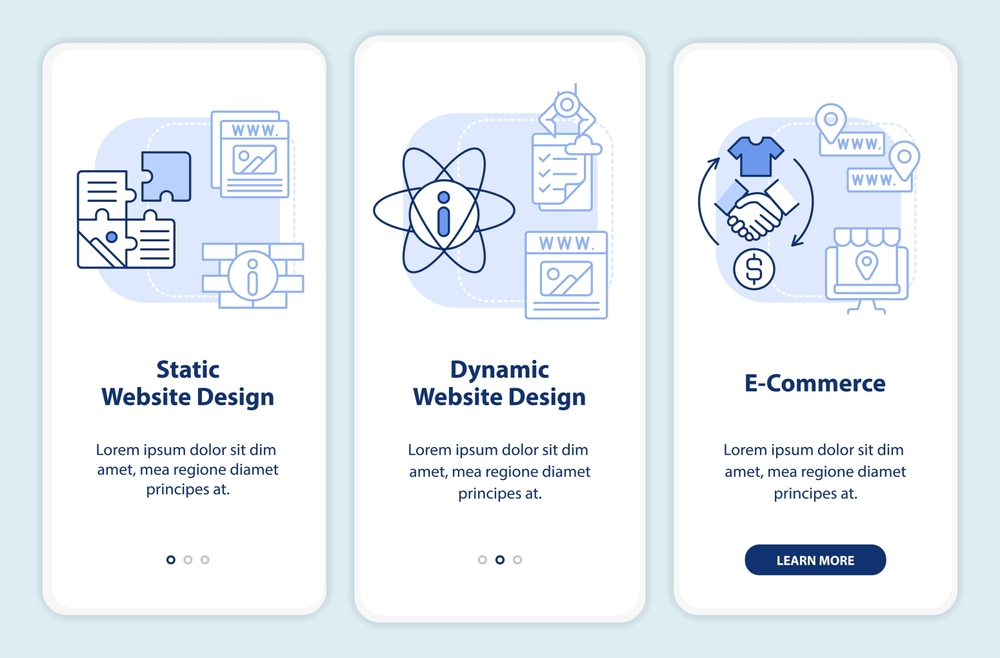Static vs. Dynamic Websites: Which is Right for Your Business?
Introduction: Understanding the Difference
Static vs. Dynamic Websites: In the world of web development, the terms static and dynamic describe two different types of websites, each with its own set of features, benefits, and challenges. Deciding between a static or dynamic website can significantly impact your business’s online presence, user engagement, and maintenance requirements. In this blog, we’ll explore the differences between static and dynamic websites, and help you determine which option is best suited for your business needs.
What is a Static Website?
Definition and Characteristics
A static website is built using basic HTML, CSS, and JavaScript, and displays the same content to every visitor. These websites are typically straightforward, with each page coded individually and served to the user without any backend processing.
Advantages of Static Websites
- Simplicity: Static websites are relatively easy to create and maintain, making them ideal for small businesses or personal websites that don’t require frequent updates.
- Speed: Since static websites don’t require server-side processing, they load quickly, which can improve user experience and SEO rankings.
- Cost-Effective: Development and hosting costs for static websites are usually lower than dynamic websites, as they require fewer resources.
Disadvantages of Static Websites
- Limited Functionality: Static websites lack the interactive features that modern users expect, such as user logins, dynamic content updates, or e-commerce capabilities.
- Manual Updates: Any change to the content or design requires manual coding, making it time-consuming to keep the site up to date.
What is a Dynamic Website?
Definition and Characteristics
A dynamic website generates content in real-time based on user interactions or other inputs. These websites are powered by server-side technologies like PHP, ASP.NET, or Node.js, and often use databases to manage content.
Advantages of Dynamic Websites
- Interactive Features: Dynamic websites can offer personalized content, user accounts, real-time data updates, and other interactive features that engage users.
- Easy Content Management: With a dynamic website, you can easily update content through a Content Management System (CMS) without needing to alter the code.
- Scalability: Dynamic websites are more scalable, allowing for the addition of new features, pages, and functionalities as your business grows.
Disadvantages of Dynamic Websites
- Complexity: Developing a dynamic website is more complex and requires a higher level of technical expertise, which can lead to higher development costs.
- Slower Load Times: Dynamic websites may have slower load times due to server-side processing, which can affect user experience if not optimized properly.
- Higher Costs: The need for ongoing maintenance, updates, and more powerful hosting solutions can make dynamic websites more expensive in the long run.

Key Differences Between Static vs. Dynamic Websites
1. Content Updates
- Static Websites: Content changes require manual coding and deployment.
- Dynamic Websites: Content can be updated easily through a CMS or automatically based on user interactions.
2. User Experience
- Static Websites: Offer a uniform experience to all users, with no personalization or interactivity.
- Dynamic Websites: Provide personalized, interactive experiences, making them suitable for businesses that want to engage their audience more deeply.
3. Development Time and Cost
- Static Websites: Quicker to develop and less expensive upfront.
- Dynamic Websites: Take longer to develop and are more costly due to the need for advanced programming and integration of databases.
4. Security
- Static Websites: Generally more secure, as there are fewer points of entry for hackers.
- Dynamic Websites: More vulnerable to security risks, especially if not properly maintained, due to the complexity of server-side processing and database connections.
When to Choose a Static Website
Ideal Scenarios for Static Websites
- Small Businesses and Personal Projects: If you need a simple, brochure-like website with minimal updates, a static website is a cost-effective and efficient solution.
- Temporary Campaigns: Static websites are perfect for landing pages or temporary promotional sites that don’t require user interaction.
When to Choose a Dynamic Website
Ideal Scenarios for Dynamic Websites
- E-Commerce Platforms: If your business involves selling products or services online, a dynamic website with shopping cart functionality, payment gateways, and user accounts is essential.
- Content-Heavy Websites: Blogs, news sites, and other content-driven platforms benefit from the ease of content management and updates that dynamic websites offer.
- Interactive User Experiences: Businesses that want to offer personalized user experiences, such as membership sites or online portals, should opt for a dynamic website.
Conclusion: Making the Right Choice for Your Business
Static vs. Dynamic Websites
The decision between a static and dynamic website depends largely on your business needs, budget, and long-term goals. A static website may be sufficient if you’re looking for a simple, fast, and cost-effective solution. However, if you need a more interactive and scalable platform that can grow with your business, a dynamic website is the way to go.
Regardless of your choice, investing in professional web development services can ensure that your website is not only functional but also optimized for performance, security, and user engagement. If you’re still unsure which option is best for you, consulting with a web development expert can provide clarity and help you make an informed decision.
External Links
- Understanding Website Types: Static vs. Dynamic
- Choosing the Right Website for Your Business
- For expert advice on choosing the right website for your business, Contact Us today.
Read more related articles to enhance your knowledge and make informed decisions about cosmetic procedures.
Why Custom Website Development is Essential for Your Brand
Why Your Business Needs Professional Web Development Services







